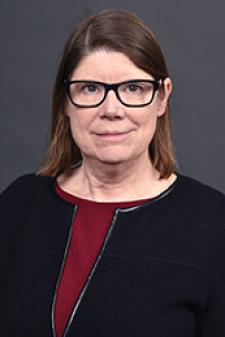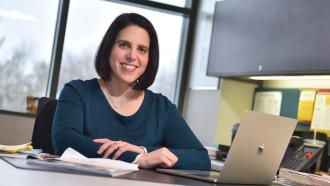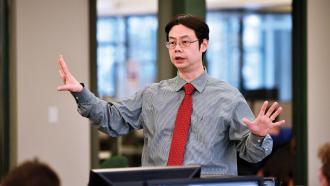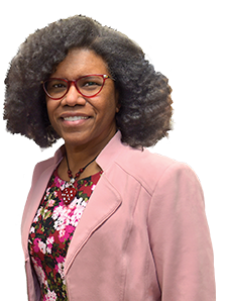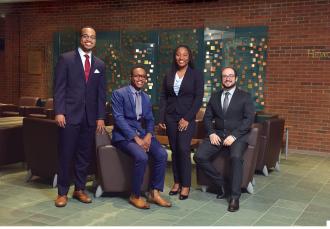Faculty Impact
WMU researchers study food consumption behavior during COVID-19 pandemic
Two Western Michigan University marketing researchers are at the forefront of understanding how a pandemic like the novel coronavirus affects food consumption behavior.
Dr. Ann Veeck, professor and acting chair in the Department of Marketing, and Dr. Hu Xie, assistant professor of marketing, conducted a survey in China from Feb. 15 to Feb. 23, as the COVID-19 virus was rapidly spreading in several regions. With government guidance that people should leave their homes as little as possible, Veeck and Xie, who was the lead researcher on the project, examined food shopping, preparation and consumption behavior, and the coping mechanisms people use during a widespread, deadly epidemic.
Initial findings
-
People increased online ordering and delivery of food, with some respondents reporting that they ordered food online for the first time.
-
Preferred sources for online delivery of food included a combination of local, national and international providers. Some respondents reported that the largest online retailers had shortages of important products. Some local entrepreneurs filled those gaps.
-
People who continued leaving their homes to buy food and household products often increased time between trips and bought large orders of food at one time.
-
58.6% of households reported stocking up on food and beverages. Frequently noted choices were rice, flour, instant noodles, frozen dumplings and bottled water.
- Many people reported increasing the healthiness of their diet to increase immunity. Interestingly, people who perceived that they had control over their health claimed to be increasing their consumption of healthy foods, while people who felt health is largely due to luck reported increasing the consumption of junk food, snacks and alcohol.
Implications
- The types of goods that are in demand are largely predictable—pasta, canned and frozen foods, cleaning products and paper goods. Manufacturers should have plans in place to increase production and supply of these goods in emergencies.
- Retailers should rearrange their stores to allow people to quickly select the goods that are most in demand and then pay and leave quickly to decrease human contact.
- Retailers, both local and international, should be prepared to create and communicate the availability of flexible delivery systems that can accommodate dynamic local situations.
“With pandemics like this one, there are severe health, economic and social consequences,” says Veeck. “Many experts believe that similar pandemics are inevitable in the future. Long-term, the results from the study have the potential to assist public policy officials and health authorities, as well as manufacturers, wholesalers and retailers in anticipating how consumers will react in epidemics.”
“We hope our ongoing research will aid decision makers in understanding and addressing critical needs.”—Dr. Ann Veeck
For many, food is not only necessary for survival but also a source of comfort. Xie looks forward to exploring that dimension in future research. “This study may shed light on the psychological motivations for food consumption during an epidemic and what coping strategies best allow consumers to adapt to new conditions in a crisis.
Dr. Laurel Ofstein’s research shows how women entrepreneurs use grit and resilience to achieve profitable growth
“This is not just a story about barriers. The women in this study persevered and adapted in spite of the challenges they encountered.”
—Dr. Laurel Ofstein
More women are starting businesses than ever before. Between 2007 and 2018, the number of women-owned businesses grew by 58%—nearly five times the national average—yet, just 2.2% of all venture capital in the U.S. goes to companies founded solely by women.
Beyond access to funding, there is no shortage of challenges women entrepreneurs face. But Dr. Laurel Ofstein, associate professor of management, has found that—regardless of obstacles—female founders use grit, resilience and leadership to achieve profitable growth.
Ofstein contributed to a study led by Dr. Lakshmi Balachandra of Babson College that revealed three key themes around the hurdles women face in growing their businesses: market misperceptions, network exclusion and managing expansion with underfunding.
“We found that there are gender-based impediments for women entrepreneurs in growing their businesses, even after significant success (defined in this study as $5 million in annual revenue) has been achieved,” Ofstein says. She adds that commitment to long term growth is critical, even when that strains existing resources.
The authors concluded the study by offering a number of actionable strategies, such as developing strong workplace cultures, buying from and funding women-owned businesses and creating new, more inclusive networks, which can lead to long-term success for women entrepreneurs.
Dr. KC Chen earns second prestigious Fulbright award
For an impressive second time, Dr. Kuanchin (KC) Chen, professor of business information systems, co-director of the Center for Business Analytics and John W. Snyder faculty fellow, has earned a highly competitive Fulbright Specialist Award from the U.S. Department of State. The honor recognizes Chen’s achievements both nationally and internationally.
With his award, Chen will complete a project at Warsaw University of Life Sciences in Poland that aims to exchange research experiences and establish partnerships.
“I am very humbled to join my fellow awardees, some of whom are also recipients of the Nobel Prize, Pulitzer Prize and other prestigious honors,” Chen says. “This project will allow me to share my research, teaching and curriculum design experience in analytics and project management, which will help build expertise at the host institution.”
Considered the world’s premier international educational exchange program, Fulbright is devoted to increasing mutual understanding between the United States and other countries.
Chen has championed the development of one of the nation’s 28 undergraduate business analytics programs at the Haworth College of Business. He has also received more than 10 research and teaching awards from multiple organizations in his discipline, scholarly journals, WMU and several other institutions. Chen’s work has been widely cited by authors from more than 60 disciplines, including business, engineering and science.
A safe space for all students
In an effort to build supportive communities focused on professional and personal success, Dr. Ola Smith, chair of the Department of Accountancy, helped students reestablish the WMU National Association of Black Accountants chapter. Smith herself has been involved with NABA since she was an accounting student. A chapter had been active on WMU’s campus in the past.
“For me, NABA is critical to promoting accountancy and finance to a new generation of African American students and to retaining talented students in our discipline,” says Smith. By offering experiential learning opportunities, academic support, and a safe space for all students, the organization is having an important impact in the college.
“NABA creates a family. We are there for each other throughout the entire professional journey,” says senior and NABA treasurer Christopher Bailey.
That journey is critical.
“The opportunity gap is real,” says Bailey. “I am personally committed to advocating for diversity and inclusion in the accounting field. Studies have shown that the percentage of African Americans in the accounting field has steadily declined. Having an active NABA chapter is an effective way to help bridge the gap within our profession.”
Senior Spencer Robertson, president of the renewed NABA chapter, had a vision for the organization as one that would challenge students in the best possible ways. “We are currently in the growth stage,” says Robertson. “Getting the chapter back up and running has come with its fair share of challenges; however, the rewards are worth it.”
The original WMU NABA chapter was started in 1987 by Kevin Carter, B.B.A.’89 and the late Michael Westbrook.
This fall, 19 members attended NABA’s Regional Conference, participating in professional development sessions, mock interviews, a career expo and interviews for internships and full-time opportunities. Many students walked away with full-time job offers.
“The NABA regional conference was one of the best experiences I have had through the Haworth College of Business,” says senior Andrew Miller. “Every person was approachable. There was no sense of competition or elitism. The concept of diversity was truly embraced. I never felt out of place.”
Junior and NABA Secretary Kayce-Ann White notes, “The connections I have made at NABA meetings through different social events increased my self-esteem and confidence level.”
And that increased sense of confidence translates to positive student outcomes.


